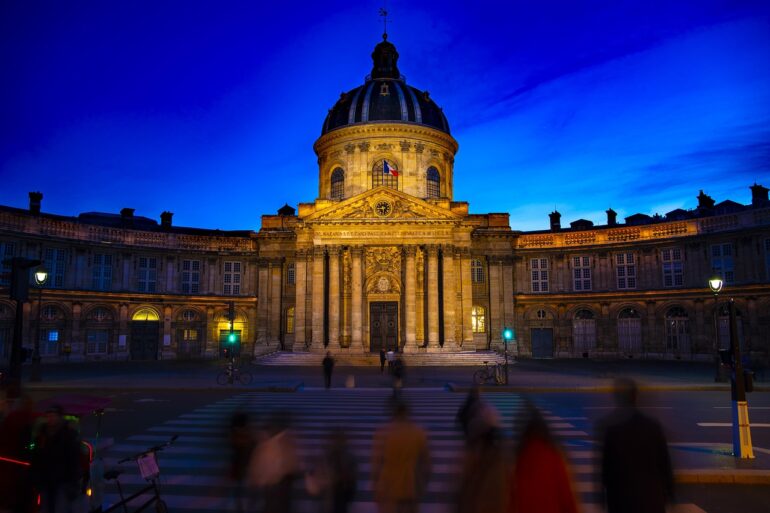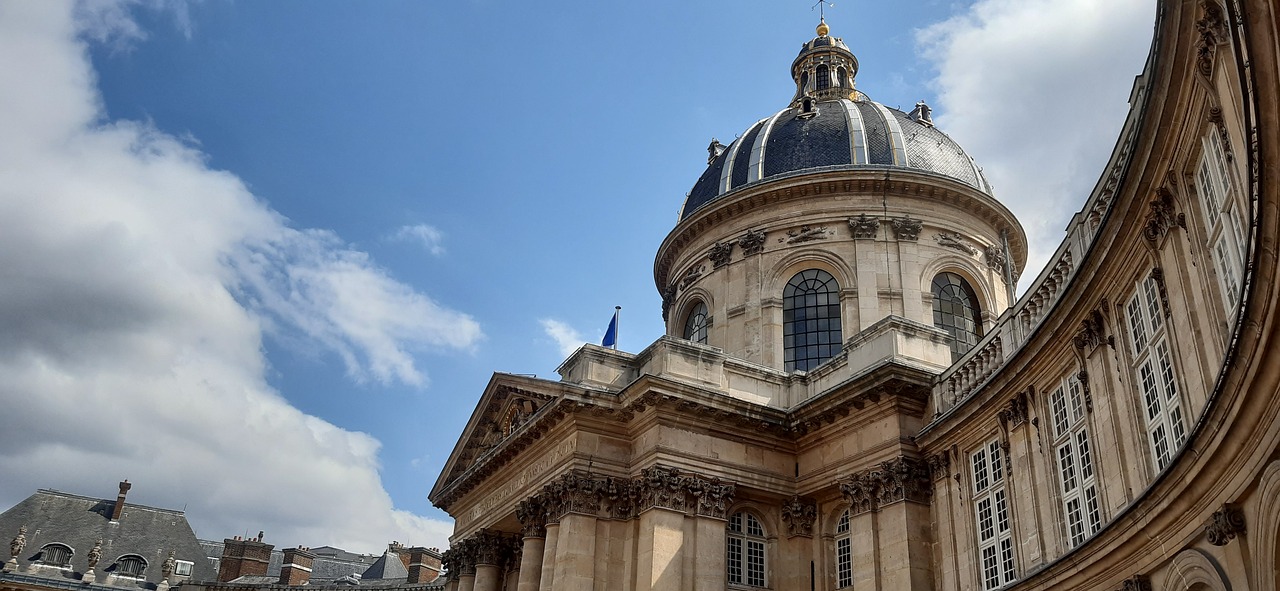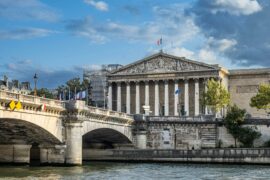What is the Institut de France?
The Institut de France is a prestigious institution, often regarded as the guardian of French culture and knowledge. Founded in 1795, it brings together five academies that play a crucial role in preserving and promoting the arts, sciences, and humanities. The institute stands out for its ability to unite experts and enthusiasts from a wide range of disciplines, making it a true pillar of French cultural life.
Located on the Left Bank of the Seine in Paris, the Institut de France is where history and modernity meet. Its main building, the magnificent domed structure, is an architectural masterpiece that attracts visitors from around the world. Art lovers and curious minds alike find here a space where tradition and innovation coexist in harmony.
Beyond its role as a conservator, the Institut de France is also an active player on the French cultural scene. It organizes events, exhibitions, and lectures that contribute to the enrichment and dissemination of cultural heritage. As such, it is essential to the vitality of French culture, both nationally and internationally.
History and Foundation of the Institut de France
The history of the Institut de France is closely tied to the French Revolution. Established in 1795, the institute was designed to unify knowledge and encourage scientific and literary progress. Its creation aimed to establish a body that could advise the government and serve the common good by promoting education and research.
Its origins trace back to the founding of the Académie française in 1635 by Cardinal Richelieu. Over the centuries, other academies were created, each contributing to the richness of France’s intellectual landscape. In 1795, the integration of these academies under the banner of the Institut de France marked a turning point in the institutional organization of knowledge in France.
Today, the Institut continues to thrive thanks to its ability to adapt to social and technological changes. It remains a model of stability and continuity, preserving traditions while embracing innovation. This balance is what makes the Institut a unique institution—firmly rooted in the past, yet open to the future.
The Main Institutions Within the Institut de France
The Institut de France is composed of five academies, each dedicated to a specific domain of knowledge:
-
The Académie française – Founded in 1635, it is responsible for the French language, ensuring its preservation and evolution.
-
The Académie des Inscriptions et Belles-Lettres – Focused on ancient civilizations and classical languages.
-
The Académie des Sciences – Established in 1666, it promotes the exact and natural sciences.
-
The Académie des Beaux-Arts – Dedicated to the visual arts, it supports creativity in all its forms.
-
The Académie des Sciences Morales et Politiques – Concerned with human and social sciences, it enriches intellectual and ethical debates.
Each of these academies plays a vital role in its respective field, contributing to the wealth and diversity of French intellectual heritage. They organize public sessions, conferences, and award prizes that honor excellence in their domains.
Through these academies, the Institut de France provides a space for reflection and exchange where ideas circulate freely. This unique model encourages interdisciplinary collaboration, which is essential to innovation and cultural development.
The Role of the Institut de France in French Culture
The Institut de France is more than a custodian of heritage—it is a key player in the evolution of French culture. By uniting the efforts of several academies, it ensures the transmission of knowledge while stimulating innovation. Its influence extends far beyond national borders, spreading French culture around the world.
Over the years, the Institut has adapted to societal and technological changes. By supporting innovative artistic and scientific projects, it helps keep France at the forefront of research and creativity. It plays a fundamental role in the continuous renewal of French culture, ensuring that heritage remains vibrant and ever-evolving.
In a constantly changing world, the Institut de France stands as a symbol of stability and continuity. It embodies values of excellence, rigor, and knowledge sharing—values at the core of French cultural identity. As such, it is a source of inspiration for anyone seeking to understand and contribute to the enrichment of our shared heritage.
Events and Exhibitions at the Institut de France
The Institut de France regularly organizes events and exhibitions that highlight the country’s cultural and scientific heritage. These occasions give the public the opportunity to discover rare works, scientific breakthroughs, and philosophical reflections that enhance cultural discourse.
Temporary exhibitions, often held in the institute’s stunning halls, cover a wide range of themes—from classical and contemporary art to historical and scientific subjects. They offer a platform for artists and researchers to present their work and engage with audiences.
In addition, the Institut hosts lectures, symposiums, and seminars that draw thinkers and creators from around the globe. These events are essential for promoting intercultural dialogue and strengthening connections between disciplines, contributing to the vibrancy of the French cultural scene.
Exploring the Collections of the Institut de France
The collections of the Institut de France are incredibly rich, encompassing artworks, manuscripts, scientific instruments, and historical archives. These treasures are housed across its academies and can be accessed through guided tours or temporary exhibitions.
Among these gems are masterpieces by renowned artists, exceptional craft objects, and rare documents that trace the history and evolution of science and the humanities in France. These collections reflect centuries of knowledge and creativity and continue to inspire researchers and artists today.
Accessing these collections offers insight into the Institut’s cultural impact. By preserving and showcasing these treasures, the Institut plays a crucial role in transmitting cultural heritage to future generations, ensuring its continued relevance and accessibility.
Visiting the Institut de France: Practical Information
For those wishing to explore the Institut de France, several options are available. Guided tours offer a unique opportunity to discover behind-the-scenes aspects of this prestigious institution, with expert guides sharing their passion and knowledge.
-
Opening Hours: The Institut is generally open to the public during exhibitions and special events. It is recommended to check the official website for current dates and schedules.
-
Tickets: Entry fees vary depending on the event or exhibition. Some visits are free, while others require a ticket. Discounts are often available for students and seniors.
-
Access: Located at 23, Quai de Conti in the 6th arrondissement of Paris, the Institut is easily accessible by public transport. The nearest metro stations are Pont Neuf and Odéon.
Visiting the Institut de France is an enriching experience that offers a deep dive into French history and culture. Whether you’re passionate about art, science, or history, there is something for everyone.
Notable Figures Associated with the Institut de France
Over the years, the Institut de France has welcomed many influential figures who have left their mark on French cultural and intellectual history. These include writers, scientists, artists, and philosophers whose works continue to shape our understanding of the world.
Famous names such as Victor Hugo, Louis Pasteur, and Claude Monet have been associated with the Institut, adding to its prestige and influence. Their work and ideas have had a lasting impact on their respective fields.
Through their contributions, these individuals embody the spirit of excellence and innovation that defines the Institut de France. Their legacy continues to inspire current and future generations, demonstrating the vital role the Institut plays in preserving and promoting French culture.
The Institut de France and the International Influence of French Culture
Thanks to its many initiatives and partnerships, the Institut de France plays a vital role in promoting French culture internationally. By organizing events and participating in global projects, it helps spread French values and ideas around the world.
The Institut collaborates with similar institutions abroad, creating cultural and intellectual bridges that enrich global dialogue. These partnerships foster knowledge exchange and mutual understanding, contributing to a shared global culture.
As an ambassador of French culture, the Institut actively participates in international forums, traveling exhibitions, and educational programs. These efforts strengthen France’s global presence and reinforce its role as a leader in the arts, sciences, and humanities.
Conclusion: The Institut de France, a Pillar of Cultural Heritage
In conclusion, the Institut de France is an essential institution for anyone interested in France’s cultural and intellectual heritage. By bringing together talents and knowledge, it contributes to the richness and diversity of French culture while playing a crucial role in its global reach.
The Institut embodies the values of excellence, tradition, and innovation. It is a living witness to the evolution of French culture and a beacon for those seeking to explore and preserve our collective heritage.
I invite you to discover this fascinating institution for yourself. Whether through a visit, attending an event, or exploring its online resources, the Institut de France has much to offer. Don’t miss the opportunity to deepen your understanding of French culture and knowledge.






